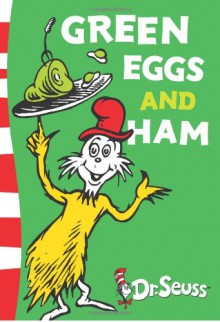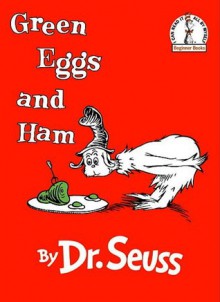

Reading Green Eggs and Ham to stubborn children is definitely a preferred alternative to torture. Introducing new foods to the very young can be a gruelling task, for parent and child alike. Seuss teaches that ‘new’ doesn’t automatically mean you’ll hate it. In that respect it kind of reminds me of The Croods with the ‘Anything new is bad’ ethos also being turned on its head.
Confession: this is my first Seuss. Yes, I went through my childhood without laying hands on single copy of the millions of Seuss books sold worldwide. At least give me points for reading one now. I can certainly see why he’s much loved. His delighful combination of the three Rs of poetry – rhythm, rhyme and repetition – are rather pleasing to the ear.

bookshelves: film-only, published-1960, kiddlewinks, winter-20132014, food-glorious-food, poetry
 film only
film only

I came across this article and laughed at first. How ridiculous that a children's book was banned not because of the content, but because the Texas State Board of Education confused the name of the author with that of a Marxist philosopher. How absurd that James and the Giant Peach was banned at a school in Texas because it contains the word "ass," never mind that the word is referring to the animal, "a long-eared, slow, patient, sure-footed domesticated mammal"[dictionary.com]. If an ass was good enough for Jesus... John 12:14 "And Jesus, when he had found a young ass, sat thereon; as it is written." "What would Jesus do" when presented with this book? Get your mind out of the gutter, Texas.*
But this really isn't funny. It is frightening how frequently the ignorant and judgmental try to control the dissemination of knowledge. God, if they could read what I do. I think half of Texas would die of horror and shock just reading this blog. For the record, two of these books were banned on homosexual grounds including Green Eggs and Ham. Seriously.
[Stolen from Buzz Feed]
The land of the free.
When: 1987
Why: The book was banned and then reprinted because it originally showcased a topless beachgoer (not like anyone could find her if they tried, though).

When: 1988
Why: Everyone’s favorite childhood book was banned from a public library in Colorado because it was considered “sexist.” It was also challenged by several schools because it “criminalized the foresting agency.”

When: 2006
Why: Talking animals are somehow considered an “insult to god,” resulting in this book’s banning throughout random parts of the United States. Several institutions in Turkey and the UK have also banned the book, claiming that the character of Piglet is offensive to Muslims. Other institutions claim that the book revolves around Nazism.

When: 1999
Why: The book was banned from an elementary School in Texas because it included the word “ass.”

When: 1983
Why: The book was banned from several schools for being “a bad example for children.” It was also challenged for teaching “children to lie, spy, talk back, and curse.”

When: 2010
Why: Forget anti-semitism; the 50th Anniversary “Definitive Edition’” was instead banned by a Virginia school because of its “sexual content and homosexual themes.” Additionally, the book was previously banned by several schools in the United States because it was “too depressing.” Most recently, in May of 2013, a Michigan mom tried to get the book banned due to its “pornographic tendencies.”

When: 1996
Why: The book was banned from several classrooms in Pennsylvania on accounts of “profanity, disrespect for adults, and an elaborate fantasy world that might lead to confusion.” The book has also been banned by other schools for its use of the phrases “Oh Lord” and “Lord.”

When: 2006
Why: Similar to Winnie-the-Pooh, this book was banned in Kansas because talking animals are considered an “insult to god.”

When: 1900
Why: Apparently there are references to sexual fantasies and masturbation in this book, resulting in its ban from classrooms in New Hampshire. Since this original banning, the book has been challenged by thousands of other institutions, most famously in the 1960s in fear that it would promote drug use to children.

When: 1963
Why: The book was primarily banned in most southern states immediately following its publication, and it has since been challenged due to the fact that it promotes “witchcraft and supernatural events.”

When: 1989
Why: A California school district banned the book and claimed that it “criminalized the foresting industry” and would thus persuade children against logging.

When: “Until as recently as 1991”
Why: Remember that time when Sam I Am tried to seduce his friend? Me neither. But the book was banned in California on accounts of “homosexual seduction.” It was also banned in China for “early Marxism” from 1965 until Dr. Seuss’ death in 1991.

When: 1988
Why: A Colorado library banned the book because it embraced a “poor philosophy of life.” Additionally, since its publication in 1964, the book was under fire for comparing the Oompa Loompas to Africans. The characters’ descriptions were later changed in an edited version in 1988.

When: 1928
Why: All public libraries in Chicago banned the book because of its “ungodly” influence “for depicting women in strong leadership roles.” In 1957, the Detroit Public Library banned the book for having “no value for children of today.”

When: 2010
Why: The Texas State Board of Education briefly banned this picture book after confusing its author, Bill Martin, Jr., with philosopher Bill Martin, author of ‘Ethical Marxism: The Categorical Imperative of Liberation.’

When: 2010
Why: The 10th edition was banned in several classrooms in California because it included the definition for “oral sex.”

*I have nothing against the people of the State of Texas. I am referring to the large number of book banners that reside there. I think at least a third of all the stories I hear about books being banned or challenged come from Texas.